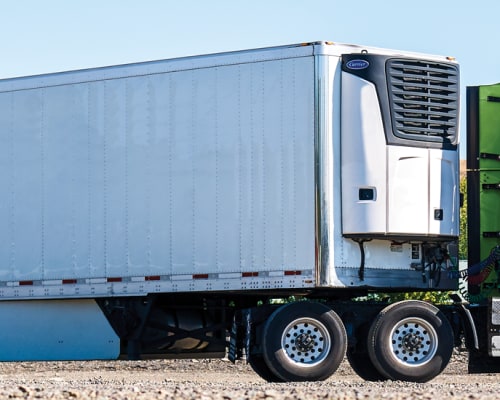Advantages of Partnering with Established Transport Refrigeration Companies
Advantages of Partnering with Established Transport Refrigeration Companies
Blog Article
A Detailed Overview of the Mechanisms Behind Refrigerated Truck Transportation and Its Role in Food Security
Refrigerated vehicle transport is crucial in maintaining food safety and security, utilizing advanced temperature level control systems and insulation technologies to protect subject to spoiling items during transit. What ramifications do these variables have for the future of food security?
Relevance of Refrigerated Transport
Cooled transportation plays a vital duty in keeping the stability and safety of subject to spoiling items throughout the supply chain (transport refrigeration companies). This specialized logistics system is necessary for maintaining the high quality of foodstuff, including fresh produce, dairy things, meats, and fish and shellfish, which are prone to spoilage when subjected to temperature fluctuations. The capacity to keep a regulated and regular setting makes certain that these items maintain their dietary worth, flavor, and safety and security for consumers
Additionally, chilled transport lessens the risks of foodborne illnesses, which can arise from the growth of harmful germs in improperly saved things. By adhering to rigorous temperature level needs, services not only conform with regulative standards but additionally foster customer trust and brand name integrity. The economic implications are substantial; lowered wasting prices equate to reduced losses for stores and providers, adding to overall productivity.
Additionally, the enhancing global need for high-quality and fresh foodstuff additionally emphasizes the relevance of refrigerated transportation. As supply chains end up being a lot more complicated and expand globally, the demand for efficient temperature-controlled logistics remains to expand, underpinning the whole food distribution network and guaranteeing that perishable products reach their locations safely and successfully.
Temperature Control Devices
Maintaining ideal temperature level control is crucial in the transportation of perishable products, and a selection of mechanisms are utilized to achieve this objective. Refrigerated vehicles utilize sophisticated refrigeration systems, largely using vapor compression technology, which circulates refrigerant with evaporator and condenser coils to remove heat from the cargo location. This procedure guarantees that the inside continues to be constantly cool, consequently preserving the high quality and safety and security of the items being transferred.
In addition, trucks are furnished with temperature monitoring systems that offer real-time information on the inner environment. These systems typically consist of digital sensors and alarms to alert operators in situation of temperature level changes, allowing instant restorative activities. Some refrigerated vehicles additionally include programmable temperature level setups, enabling specific control tailored to details kinds of cargo, such as fruits, pharmaceuticals, or vegetables.
Moreover, making use of pre-cooling strategies prior to packing improves the efficiency of temperature control. By reducing the cargo area's temperature before the intro of products, the danger of temperature level spikes during transportation is minimized. These mechanisms collectively contribute to a reliable cool chain, crucial for keeping the stability and security of subject to spoiling food things throughout the transportation process.
Insulation Technologies
Insulation modern technologies play an important duty in boosting the efficiency of refrigerated vehicle transport by minimizing thermal exchange between the cargo area and the outside atmosphere. Reliable insulation is vital for keeping the needed temperature for disposable products, consequently ensuring food safety and security and high quality throughout transit.
Usual insulation products made use of in chilled vehicles include polyurethane foam, polystyrene, and fiberglass, each providing differing degrees of thermal resistance. Polyurethane foam, understood for its exceptional insulating residential or commercial properties, is usually applied as rigid panels that can be formed to fit the vehicle's inside. Polystyrene supplies a light-weight alternative while still providing sufficient thermal defense. Fiberglass, although much less usual, can be efficient in particular applications as a result of its durability and resistance to moisture.

Advanced Surveillance Solution
To ensure the stability of perishable items throughout transport, progressed monitoring systems have actually become a pivotal advancement in the chilled vehicle industry - transport refrigeration. These systems use a mix of sensing units, data loggers, and real-time monitoring modern technologies to continually monitor temperature, humidity, and total cargo problems throughout the trip. By giving immediate comments on ecological variables, these systems allow for timely rehabilitative activities, therefore guarding product quality
Modern keeping an eye on systems are furnished with cordless connectivity, making it possible for seamless data transmission to logistical centers and stakeholders. This connection helps with remote tracking, which is vital for preserving conformity with sector guidelines and requirements. Alerts can be created in real-time, notifying drivers of any type of variances from pre-set limits, hence decreasing the risk of putridity.
In addition, the find out integration of sophisticated analytics and machine learning algorithms boosts anticipating capabilities, enabling for much better planning and risk assessment. Historic data collected from these systems can educate future transportation approaches, enhancing routes and minimizing possible dangers. Overall, the deployment of advanced tracking systems represents a substantial innovation in the chilled transportation sector, enhancing the commitment to maintaining the top quality and security of disposable items throughout their journey.
Impact on Food Safety And Security Requirements
The assimilation of innovative tracking systems in cooled truck transport has actually significantly affected food safety criteria throughout the supply chain. These systems make it possible for real-time tracking of temperature, moisture, and other essential criteria necessary for keeping the stability of subject to spoiling goods. By making sure that items remain within defined temperature level ranges throughout transportation, these technologies minimize the danger of microbial growth and perishing, which are pivotal in food security.

The adoption of data analytics likewise allows for aggressive decision-making, allowing firms to recognize potential issues before they escalate right into food safety offenses. As a result, the incorporation of advanced tracking systems not only boosts operational performance but likewise cultivates greater responsibility in the food supply chain. This development emphasizes the crucial role of innovation in boosting food safety and security standards and guaranteeing customer confidence in the products they obtain.
Final Thought
Finally, cooled vehicle transport is vital for preserving food safety via effective temperature level control, advanced insulation technologies, and continuous surveillance systems. These devices function synergistically to protect the top quality of perishable products and lower the risk of foodborne health problems. Adherence to rigid food security requirements is attained through the application of these technologies, highlighting the important duty of chilled transport in the food supply chain and its effect on public health and wellness.
Cooled truck transport is important in keeping food safety and security, utilizing advanced temperature control devices and insulation modern technologies to safeguard perishable goods throughout transportation - cold transport companies. Proper maintenance of insulation honesty, including normal checks for wear or damages, is additionally essential to sustain the effectiveness of cooled transport systems and make certain conformity with food security regulations
The integration of advanced surveillance systems in chilled vehicle transportation has substantially affected food security requirements across the supply chain.In conclusion, chilled truck transport is important for maintaining food security via reliable temperature level control, progressed insulation innovations, and constant surveillance systems. Adherence to rigorous food security criteria is achieved via the application of these modern technologies, highlighting the important function of refrigerated transportation in the food supply chain and its influence on public health.
Report this page